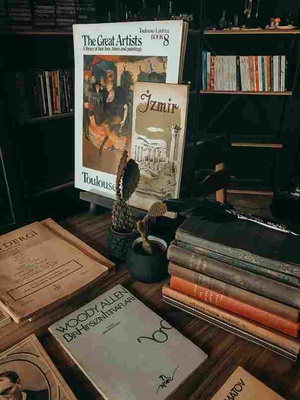How to Choose the Right Books for Kids and The Environmental Benefits of Buying Used Books

Do you have a favorite dog-eared story from a faraway kingdom or a backyard adventure? Or remember the first time you hid a flashlight under your pillow to figure out how a story ended? Choosing excellent books for your tiny child will start him on the path to learning, improve his vocabulary and object identification skills, pique his interest in the world, and provide lovely memories. Great book recommendations will help him build a love of reading as he grows older, as well as improve his vocabulary, writing, comprehension, and study skills.
Before you go out and buy something, consider the following suggestions to help you choose the best kids/children's books. We also have covered the environmental benefits of buying used books. Used books have many benefits such as saving money and finding book collections.
Choose novels that are appropriate for your child's age.
Books with a lot of rhyme and repetition appeal to young toddlers. They appreciate predictable language and eagerly accept the invitation to participate in the reading process that those books extend to them. Books with slightly more complicated plots and one to two paragraphs of reading each page appeal to preschoolers. School-aged youngsters adore novels that are appropriate for their reading level. There are three types of books: those that a child can read on his or her own, those that a child can read with an adult, and those that an adult must read to the child. Flipping through the book and reading pictures is the first level for pre-reading youngsters, and a preschooler will finish phrases in predictable language in the second level.
Books that are well-written are easy to relate to.
Choose novels that allow your child to experience new worlds and lives while remaining familiar enough for them to recognize themselves in the characters. Even if the novel is set in an imaginative world of monsters and fairies, your child will be more interested in reading it to the conclusion if the characters have hopes and desires that are simple to relate to.
Choose a wide range of books.
While it is natural for youngsters to want to read the same book again and over (which is a good thing), they should also be encouraged to read a range of books. While your youngster may enjoy fairy tales, you should occasionally read a book about dragons or pirates. Each time you go to the library, assist your child in selecting a few nonfiction books on a topic that interests them. Many libraries now include instructional books developed just for preschoolers. Children, on the other hand, will sit through a challenging text if they are sufficiently interested in the subject.
They instill essential lessons on us.
The best books often teach us things without us even realizing it, whether it's a timeless moral in The Tortoise and the Hare or numbers, fruit, and days of the week in The Very Hungry Caterpillar. Choose books that convey a powerful message or teach fundamental abilities such as the alphabet, counting, colors, or seasons in a subtle way.
Choose books with a theme that your youngster is interested in.
If your youngster like dinosaurs, princesses, wildlife, or cats, look for stories featuring those characters or nonfiction texts about the subject of interest. Ask your child what kinds of books he wants to check out before going to the library, then go online and look for books in that area. If your local library offers an online catalog, you can construct a list and print it out before you go, this will work best.
They might not be your first choice.
Libby Gleeson, a children's novelist, advises parents to "fight the impulse merely to feed their children the novels they loved when they were little" while selecting a decent book for their children. Your child may not share your enthusiasm for childhood favorites, and as Gleeson points out, "the world has changed, and children have evolved."
Invite your child to assist you in selecting books.
Show your child a book and have them flip through the first few pages, or read the first few pages aloud. Many libraries now include a comfortable seating space adjacent to the children's section where parents may sit and read with their children.
They are not difficult to comprehend.
If your child will be reading independently, use the Five Finger Rule. If there are a few tough words in the book, read it aloud with your child. There's no harm in introducing kids to more complex language in context. However, if you know the language and concepts will be too complex for them to enjoy the story, choose a simpler book to prevent putting them off reading altogether.
Choose books that have won awards.
Read books by authors and illustrators who have won Caldecott, Seuss, or other awards. Also, did you know that the New York Times publishes a best-seller list for picture books for children?
They are well-illustrated.
For early readers ages 4–8, vivid and clear imagery that complements the tale is effective. Choose novels with engaging pictures that complement the plot. Wordless books are also a terrific approach to help your child improve his or her language abilities because they force readers to understand the pictures as the story unfolds.
Choose books that are based on real-life experiences in your child's life.
Children enjoy discussing about what is going on in their life, as well as reading novels that they can connect to. If a new sibling is on the way, for example, look for a book or two about bringing a baby home. Find tale books about going to a formal preschool or starting kindergarten if your youngster is concerned. Find a book about a day in the life of a police officer if your child wants to be one. Books that are relevant to your child's life will pique their attention.
They're entertaining to read aloud.
How many times has your child asked for another Dr. Seuss reading? Reading aloud and listening to books that rhyme or have a nice lyrical flow is enjoyable. To bring the reading experience to life, read with excitement and use different voices for different characters.
Above all, take your child to the library or bookstore on a regular basis.
Make sure your youngster has access to a diverse collection of books at all times. Encourage you to set aside time during the day solely for reading. Reading can be done alone or in groups. Consider the following material and then go home and read!
They're frequently in the news.
Find out about popular children's books from your child's teacher, library, or other parents. Alternatively, look for award-winning children's book lists online or read what other parents are recommending on book review sites.
Is the text engaging and informative?
Don't judge a book or its author by its cover. While an author may be informed about a subject, he or she may not be able to connect with children in a clear and entertaining manner.
The Environmental Benefits of Buying Used Books
Many of us are beginning to examine our daily behaviors more closely now that the topic of environmentalism is at the forefront of society's thoughts. In 2020, society is more conscious than it was even ten years ago of how little, easy improvements can build up to huge environmental benefits. There are hundreds of methods to live a more carbon neutral lifestyle, like lowering our use of single-use plastic, cycling instead of driving, and limiting meat consumption.
But how does this apply to books?
The environmental cost of creating books is considerable. The newspaper and book publishing businesses use 153 billion gallons of water each year, with each book using two kilowatt hours of fossil fuels and emitting about 7.5 kilos of CO2. Worse, when a book reaches a landfill, its decomposition emits twice as much greenhouse gas and has a harmful impact on local water systems as when it was made.
When you consider that an estimated 320 million (640,000 Tonnes) of books are thrown away each year, it's easy to see how buying new books has a negative influence on the environment.
So, what can we do as book lovers to help?
There are numerous options available. In the last several years, e-readers have skyrocketed in popularity, with the manufacturing of an e-reader corresponding to about 40-50 new print books. This means that if a person reads more than this amount, using an e-reader has a lower carbon footprint than buying fresh physical copies of the same titles.
But what about the books that are currently on the market?
E-readers are bad news for the billions of books in circulation today. If every reader switched to an e-reader solely, the surplus of supply to demand for traditional books would result in massive waste and a severe impact on the environment. When you consider the carbon footprint of manufacturing the e-reader in the first place, it's evident that e-readers aren't the most environmentally friendly option.
Purchasing second hand books
There is, however, a solution: second hand books.
When you choose a second hand book over a new book, you save around a fifth of the carbon emissions. By purchasing second hand books online, you are actively preventing the same volumes from ending up in landfills, so avoiding the massive environmental damage outlined above. Second hand books still have amazing stories to tell, and while we can't undo the carbon footprint of their initial manufacture, we can ensure a carbon-neutral future by preventing them from going to trash.
There's also the bonus of second hand books being significantly less expensive than new books. With a new book being pretty expensive on average, going for the second hand books versions might save you a lot of money. Buying second hand books is therefore not only healthier for the environment, but it is also better for your wallet! Overall, buying these second hand books is a sustainable consumption technique. While the titles aren't always perfect, there's a certain romanticism in knowing that the book you're holding has been enjoyed by others before you, and will hopefully be appreciated by whoever you pass it on to next.



Comments